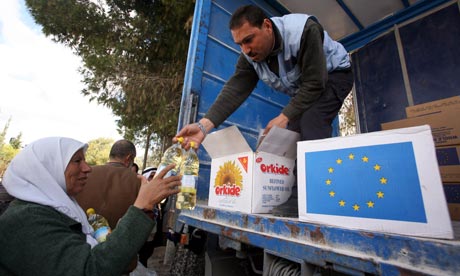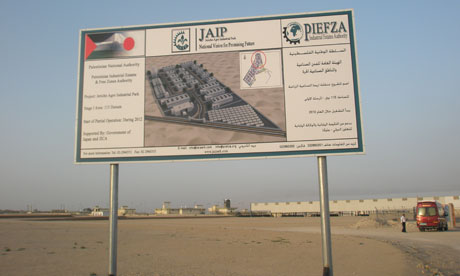Stuffing their mouths with money
The article by Allison Deger is followed by one from Gaza’s Ark putting the case for, with many links, trade not aid for Palestinians. Notes and links at end.

A Palestinian woman receives food aid donated by the European Union and the World Food Programme in the West Bank. Photo by Saif Dahlah/AFP/Getty Images
After Kerry visit, Israeli and Palestinian leaders quietly re-open economic negotiations
By Allison Deger, Mondoweiss
June 18, 2013
Perhaps the greatest achievement in neutralizing the Palestinian cause from its starting point, a liberation plight, was nudging it into a humanitarian project. Over the past two decades political talks have been exchanged for economic ones.
The subtle change is also reflected in U.S. policy, which became clear after Israeli and Palestinian leaders met in Jerusalem on Sunday to reopen economic collaboration that was unilaterally suspended by Israel last fall following the Palestinian bid for non-member observer status at the United Nations. This was the first official discussion between finance ministers Yair Lapid and Shukri Bishara, who took office last month under the also-newly-appointed Palestinian Prime Minister Rami Hamdallah–and seemingly it occurred at the behest of a U.S. balloon aid payment.
The meeting tailed Secretary of State John Kerry’s announcement that the self-appointed broker for peace would infuse $4 billion into the Palestinian economy. Unlike past endeavors, this aid did not accompany a drive for political talks; there was no demand for a Camp David, not even an Annapolis-style negotiation– talks about having talks. The aid was timed with Israeli and Palestinian leaders entering non-conditional direct economic negotiations in exchange for the funds. Or more cynically: land for money.
In all practical sense, the meeting marked the U.S. abandoning political goals through diplomacy for regular meetings between Israelis, Palestinians and foreign lenders on how to best [to] develop the West Bank. The finance ministers concluded their Sunday talk by reconvening the Joint Economic Committee (JEC), an Oslo Accords-mandated arbitration body and its sub-groups. It previously functioned as an intersection for Israeli and Palestinian leaders on industrial development programs outlined also in the Oslo-era. These include all of the big infrastructure projects in the West Bank, from manufacturing zones, to roads, to sanitation facilities (a new dump is being built now by the PA with the help of Israel, the World Bank, and the German Development Bank on land confiscated from Palestinian villagers. Like every other major project it was planned through the JEC).
PA finance minister Shukri Bishara shakes hands with his Israeli counter part Yair Lapid, June 16 2013. Photo by Anat Hamemi
Additionally, Palestinian labor in Israel and VAT taxes are under the purview of the JEC. In short, it is a body for economic collaboration not political contention, ordained by peace talks but not under the same timetable.
On a micro level, one problem with using the JEC political outcomes is that it is a non-biding body. At most it can mediate infractions. When breaches of the Paris Protocols of the Oslo Accords take place, this group can hear complaints, but it can’t force one party to live up to its commitments. For example there is no means to address the Palestinian complaint on the reduced number of workers with permits to enter Israel, which have decreased to one-sixth of the pre-Oslo number–even though the Protocols specifically state that Israel is to ensure Palestinians have reasonable access to work inside of Israel.
When the JEC was founded back in the 1990s, Israel agreed in theory to foster the Palestinian economy. But in practice those protocols were abandoned as quickly as they were drafted. For example, six points under Article IX on industry state in various ways that each party cannot “damage” or “endanger” the development projects from “the other side.” At face value it means Israel should not actively compromise businesses courted by the Palestinians. But settlement industrial zones with lax regulations on labor and tax breaks render impossible a competitive Palestinian counterpart– not to mention the pollution created by illegal dumping of toxic waste. And new state-building measures, like the Palestinian minimum wage, are undermined by the unregulated Palestinian labor practices inside of the settlement zones.

The Jericho business park, financed by Japanese aid – touted as a start-up site for Palestinian industry; but investors preferred the Israeli settlements.
Stark visuals of the JEC and the Protocols’ failure are the Palestinian industrial zones outside Jericho, Jenin and Hebron. The Jericho business park resembles a dirt parking lot rather than a state of the art facility with 24-hour access to Jordanian borders for exports—as the park was advertised, when it was courting investments. Its barren plots grimly foreshadow what can reasonably be expected from future collaborative economic projects. The Palestinian sites will sit vacant as settlements bring in more international factories.
And what of the future, after the aid arrives?
Without Israeli guarantees for the free flow of goods through checkpoints, doing business in Palestine will continue to be an unstable venture for foreign companies and lenders. Still the JEC talks will likely ease international supporters who are weary that their investments will fund projects that will never be completed, like the Jericho park. It is no coincidence then that these three major foreign-backed development zones in the West Bank all received Israeli blessings in the past and that the new $4 billion from the U.S. is preceded by re-started economic collaboration. Together they mean the U.S. is doubling-down on a Kantian-style approach to international relations; foreign intervention is employing the prospect of industrialization and liberalization to usher in and end to the conflict.
The Palestinians know what the price of that cash injection is: “A new international effort, led by the US, is taking place in order to resume final status negotiations,” the Palestinian Liberation Organization Negotiations Affairs Department announced right after Kerry committed the funds. But again, if history is a model, Israeli collaboration will do little for the Palestinian economy, even if the PA is desperate to lock in funds.
Simultaneously, the P.A. cash flow, dependent upon foreign donors, is drying up fast. The P.A. owes $4.2 billion to Israel (not including electrical debts) and just last week Sweden announced that it would cut around $30 million in funds to the PA, for lack of progress in peace negotiations.
The looming pitfall is that Palestinians leaders are making a major political concession that will harm prospects of autonomy in the future. While President Mahmoud Abbas has given in on lands swaps, he is firm that a settlement freeze is a precondition for negotiations. And the Israelis in turn, are against any preconditions. Still, the JEC meeting would amount to re-kindling negotiations, without any political demands on a final status solution. It would seem that the economic talks are mere placeholders, intended to gain international aid to keep the PA afloat. And the cost is the larger political struggle.
Facts on the ground are inching forward, though. In the absence of a real political settlement on the horizon, the new projects to come from the $4 billion will firm up economic borders and institutionalize limited sovereignty in the West Bank. The PA is demonstrating that if they ever do build a state, it will be one with Israeli oversight of their internal affairs. Thus JEC is no place for challenging the occupation (and it never was). But because of international pressure it is the only boxing ring left.
How is Gaza’s Ark not an aid project?
By Gaza’s Ark
May 01, 2013
A number of Palestinian civil society organizations have said very clearly: they do not want to depend on humanitarian aid; they need their freedom to live in dignity. The economy of Gaza has been very prosperous in the past; it can be again in the future. To get there, the entire humanitarian “aid” in the world will be insufficient without the political will to end the blockade.
The economic contribution of a boat with 40 cubic meters of goods is necessarily symbolic: the important thing is the political gesture to assert the Palestinians’ right to freedom of movement and economic sovereignty. Our slogan is not so much against aid as it is also for (fair) trade, and more broadly, in favor of economic sovereignty.
There is ample evidence that a wide range of Palestinians in fact reject the narrow concept of “aid” — which in practice really further enables the Occupation both in the West Bank and in the Gaza Strip.
Here is a small sample of the many sources on this topic:
http://palinoia.wordpress.com/aid-why-not-trade/
http://ingaza.wordpress.com/2012/09/30/gaza-looks-for-work-not-aid/
http://al-shabaka.org/unmasking-aid-after-palestine-papers
http://al-shabaka.org/node/523
http://electronicintifada.net/content/farmers-markets-bypass-foreign-aid-palestine/12240
http://electronicintifada.net/content/aid-industry-doing-no-harm-palestine/9826
We support their call.
Notes and links
Joint Economic Committee
The reconvening of the JEC was recommended by the Quartet in its March 2012 report Back to the Future: Integrating the Political and Economic Tracks
Jericho business park aims to inch Palestine towards sustainability An optimistic article fromm 2012, Guardian.
